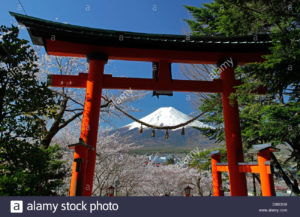Holiness Made Known
A sermon preached at the Church of the Incarnation, San Francisco, on Maundy Thursday, 2018, by Christopher L. Webber.
I think every human being comes complete with some sense of the holy, the sense that there is beyond the material world of taste and touch and sight and smell something else, something more, and though we have trouble expressing it or understanding it, it gives meaning to our lives. We speak of it as holiness; we have a sense of some further dimension of life, a transforming power that gives life meaning.
Years ago I climbed Mt Fuji in Japan, and just as you get to the top there’s a torii, a red-painted formal gate, that is used in Shinto to frame a special place  and mark it as holy. You see such torii sometimes in front of a tree or a lake, a place of natural beauty. In Shinto it’s most often places that are thought of as holy – places where that other world of power and meaning shines through into this. In Judaism, I think it’s time that conveys that sense. There’s a special time, the Sabbath Day, one day marked off as special, a time when we have a glimpse of eternity.
and mark it as holy. You see such torii sometimes in front of a tree or a lake, a place of natural beauty. In Shinto it’s most often places that are thought of as holy – places where that other world of power and meaning shines through into this. In Judaism, I think it’s time that conveys that sense. There’s a special time, the Sabbath Day, one day marked off as special, a time when we have a glimpse of eternity.
But in Christianity, I think the sense of the holy is personal. Of course we have holy days and holy places, and there have been times when we have let them control our thinking. Christians have fought over possession of Jerusalem as a holy place, and Christians have made laws about time: about the keeping of Sabbath, we have some vestige of it still in our weekends off. Sunday took the place of Saturday as a Christian sabbath, a holy time, when we could rest from work.
Of course, Jerusalem is a special place, and the loss of the sense of Sabbath in our society is a sadness – it impoverishes us. Space and time belong to God; we should never loose sight of that. And yet we are truly impoverished only when we lose sight of the centrality of Jesus; it is in his life that God is most completely revealed. For us, the holy is glimpsed, revealed, known especially in Jesus; in his life God is made known most fully.
And that’s why the Eucharist has always been so central to the Christian faith. We come here to a special place and at special times, but we could come together as well around a kitchen table on any day of the week, because we come here not so much to be at a certain place or special time but to meet with Jesus and in meeting with him to know the presence of the Holy God, the Creator of space and time. That’s why at the Last Supper with his  disciples Jesus gave them a way to renew that relationship, to be present with him, to come into the presence of the holy. “Do this,” he said, “in remembrance of me.”
disciples Jesus gave them a way to renew that relationship, to be present with him, to come into the presence of the holy. “Do this,” he said, “in remembrance of me.”
That word “remember” is a misleading word in English, it has a whiff of nostalgia about it, recalling someone or something absent, no longer here. Not so in Hebrew and Greek where the word has to do with making present again, with the reality of presence, with calling back into the here and now. I may have used this illustration before but I don’t know a better one. Suppose you’re walking down the street and someone walking toward you puts out his hand and says, “Hi, I’m Bill Jones. Remember me?” And you say, “Well of course I remember you!” But you hadn’t thought about old Bill in forty years and you remember him now only because he is here.
It’s like that with the Eucharist. We all too easily forget Jesus in our daily lives, but we come here and remember because Jesus is here. No wonder, then, that we treat this bread and wine so carefully: we put some aside in a special place for the sick, even as a help to focus our devotions. Here, in this church, there’s usually a candle burning to remind us that Jesus is truly present, the distance between time and eternity is dissolved, and this place, this time is holy because God is with us in Jesus.
Yes, God is with us here in this place, now at this time, but more than that, here in this sacrament he himself comes to meet with us in person and go out with us in our persons so that in us and through us the world will come to know the holiness of God. The holy God is made known to us in Jesus and made known to the world in us.
 Christopher L. Webber
Christopher L. Webber